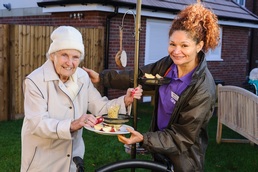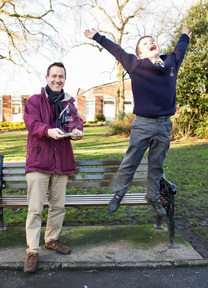Therapeutic bird song CD helps older people relax and reminisce

Nature is being brought inside through the use of an interactive CD containing bird songs for older people to listen to together with care workers or family members.
The CD uses the sounds of nature to act in a therapeutic way and promote wellbeing in older people, who might not be able to go outside due to complex health conditions.
The CD, which comes with a guidebook revealing the types of bird behind the familiar bird songs, which can be used as a reminiscence tool or form the basis for quizzes to stimulate a person’s memory in a non-challenging way.
People may want to listen to the bird song to feel closer to nature or to help create conversations and interactions.
Care UK’s head of dementia Maizie Mears-Owen said: “There is a growing band of evidence about the therapeutic effect of birdsong so, as well as helping to promote wellbeing amongst people living with dementia, it provides a great opportunities for quizzes and reminiscence activities that is fun, stimulating and doesn’t require my colleagues to have a detailed knowledge of birds to run them.”
The recordings of 40 different bird songs have been donated by Malcom Clark from Suffolk who has spent years collecting the distinctive bird sounds from across the UK.
Care UK has also been involved in this year’s RSPB bird watch campaign by encouraging care home residents to observe and interact with nature.
Pyela Mwale, home manager at Scarlet House in Stroud said: “Connecting with our outdoor space and taking the time to observe birds and wildlife can be extremely beneficial for residents, particularly for those who are living with dementia.”
“The quiet, calming nature of bird watching can help lower anxiety, while the colourful sights and distinctive sounds of our feathered friends provide plenty of sensory stimulation. Bird watching can also be a valuable reminiscence activity, with the appearance of certain species and the sounds of bird song evoking memories and it also helps residents recall their love of nature.”
She added: “Sitting and watching the birds come and go quickly becomes an enjoyable shared interest for residents which can help combat any feelings of isolation, while practical tasks such as helping to clean and fill bird feeders can also be very fulfilling.”
Latest Innovative Care News
 13-May-19
'Pink drink' brain cancer treatment rolled out across NHS in memory of Baroness Jowell
13-May-19
'Pink drink' brain cancer treatment rolled out across NHS in memory of Baroness Jowell
 25-Apr-19
Louis Tomlinson helps 83-year-old who lost wife to dementia complete bucket list
25-Apr-19
Louis Tomlinson helps 83-year-old who lost wife to dementia complete bucket list
 05-Mar-19
Care worker of the year inspires nine-year-old son to work in care
05-Mar-19
Care worker of the year inspires nine-year-old son to work in care
 12-Feb-19
Michael McIntyre's jokes tested to see if they stop elderly catching flu
12-Feb-19
Michael McIntyre's jokes tested to see if they stop elderly catching flu
 25-Jan-19
Ninety-year-old and his dog can stay together, thanks to care worker
25-Jan-19
Ninety-year-old and his dog can stay together, thanks to care worker